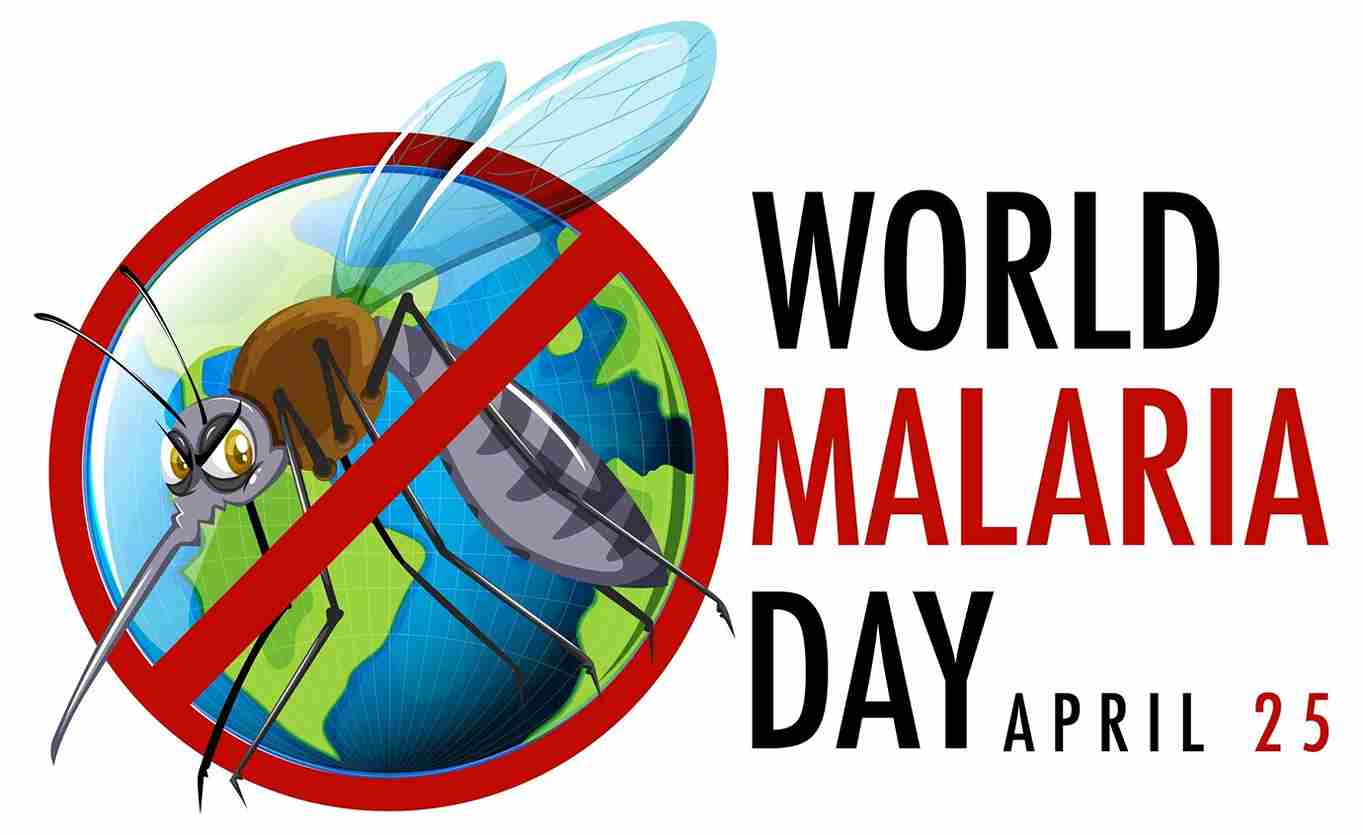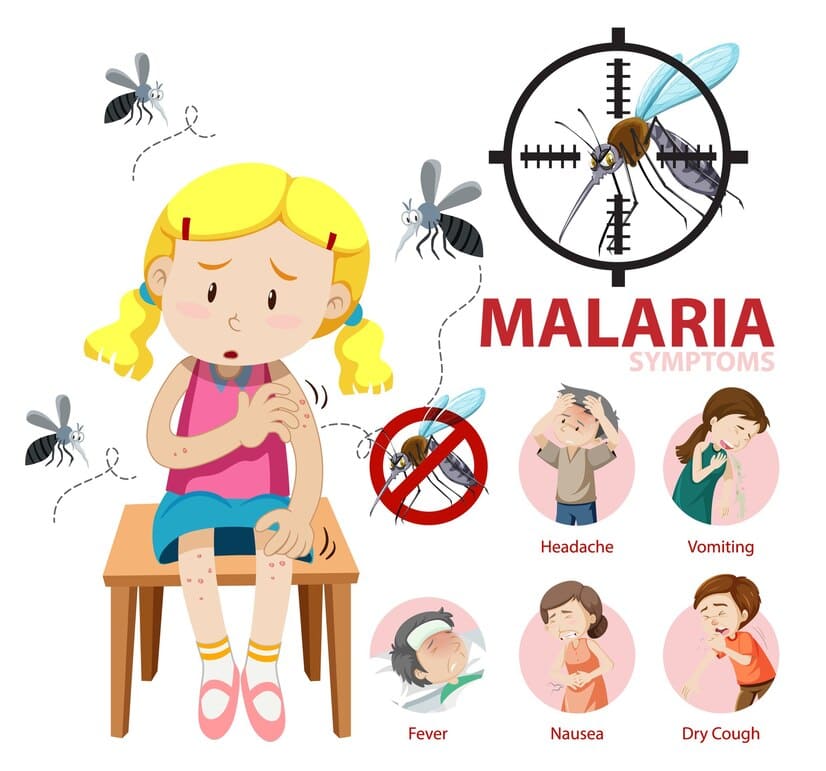
Malaria is highly infectious disease, that is caused by parasite Plasmodium Species (protozoa) and it is transmitted through infected female Anopheles mosquitoes.
Malaria is highly infectious disease, that is caused by parasite Plasmodium Species (protozoa) and it is transmitted through infected female Anopheles mosquitoes.
Malaria is a preventable and treatable disease but one the highly contagious diseases as it takes lives over Six Lakhs of people a year globally.
There are 5 species can infect humans, plasmodium falciparum, plasmodium vivax, plasmodium malaria, plasmodium ovale, and plasmodium knowlesi.
Malaria can be tested by laboratory tests of malaria is microscopic because it is easy to use and cheap.
25th April is World Malaria Day, a global malaria awareness event.

The symptoms of malaria started after 10-15 days after the infected bite of a mosquito. Generally, malaria starts with a high fever and chills. After 3-6 hours fever subsides and leads to profuse sweating.
Malaria is curable early diagnosis and prevention is best treatment for affected person. As the symptoms, consult your doctor and visit the diagnostic centre and get tested immediately.
What Is the Main Cause of Malaria?
Malaria is caused by parasite- Plasmodium. When Anopheles mosquito bites a person with malaria, the mosquito becomes infected. Parasite present in salivary gland of female mosquito. This infected mosquito bites another person than plasmodium parasite transfer it to second person. It’s possible, but rarely, for malaria to be passed through blood transfusion, organ donation and used needles.
What Are the Signs and Symptoms of Malaria?

- Fever and sweating
- Chills
- Fatigue
- Diarrhoea
- Arthralgia/ joint pain
- Nausea or Vomiting
- Anaemia
- Bodyache/ pain in body
- Dry cough
- Headache
- Spleen enlargement
In addition, a severe form of malaria, which may progress and cause following symptoms which is fatal for an individual -
- Coma in case of cerebral malaria
- Acute renal failure or kidney failure
- Pulmonary oedema
- Jaundice
- Haemoglobinuria (black water fever)
- Convulsion
- Shock
- Malaria is fatal
What Are the Complications of Malaria?
Malaria represents a medical emergency as it is spread easily and progress in complications rapidly and may lead to death in severe cases.
Symptoms may appear 3-7 days after infection but chances of severe complications remain same. Complication involves the nervous, respiratory, renal/kidney, or hematopoietic system. For early diagnosis it is recommended to go for malaria test in every febrile (high fever) patients. Severe malaria may develop even after the initial treatment response and complete clearance of parasitemia.
Neurologic Complications of Malaria-
Cerebral malaria is most common complication of malaria which causes death in adults.
The cerebral malaria symptoms includes generalised convulsions, drowsiness, confusion which is followed by the coma, from few hours to few days.
Other than this cerebral malaria may cause other neurologic sequelae such as cranial nerve abnormalities, tremors and ataxia.
Pulmonary Complication
Liver injury may occur as the disease onset within few days.
Symptoms Are - pulmonary edema, tachypenea, dyspnea and respiratory failure.
Renal Complications
It may cause kidney failure and patient may require temporary dialysis.
The black water fever- this term is used for dark red, brown or black urine which is due to massive intravascular hemolysis and resulting hemoglobinuria.
Hypoglycemia
It occurs due to the use of Anti malarial drug, which induce hyperinsulinemia. Hence, regular monitoring of disease by laboratory examination is necessary in malaria patients.
Complication of Malaria in Pregnancy
Malaria complication pregnancy includes low birth weight due to intrauterine growth, premature labor, maternal anemia, miscarriage, and congenital malaria (malaria in new born child since birth).
How Is Malaria Diagnosed?
Malaria is fatal disease; diagnostic centre plays a crucial role in identifying the malaria parasite in body. Firstly, your doctor will analyze the patient clinically and then diagnostic tests are advised for further evaluation and confirmation
A comprehensive range of malaria tests-
Blood Test :
Blood test is most common and reliable test for diagnosing malaria in the blood smear test.
Complete Blood Count (CBC): This helps detect anemia or other infections.
The parasite can be identified in blood by these tests-
Blood smears- Two types of smear test are used to identify the malaria, these are-
Thick blood smears
Thin blood smears
Malarial Parasite (MP) Smear Test
Blood smear allows comprehensive evaluation of patient’s blood for malaria parasites.
Rapid diagnostic tests-
Malaria antigen detection tests is blood smear test which is gold standard test for malaria parasite.
RDTs are made to find particular antigens, or proteins, that the malaria parasites produce. These tests can yield results in just 15 to 30 minutes and it only requires a little sample of the patient's blood
Molecular Test :
RT-PCR Malaria
PCR-DNA detection test: PCR also known as polymerase chain reaction is useful for determining whether a patient has been infected with the new type of malaria parasite or with the old or same type of parasite
Serology Tests :
Serology test used to evaluate the antibodies against malaria by using indiect immunoflurosence (IFA) or enxyme-linked immunosorbent assay(ELISA).
Antigen Ddetection Test :
Malaria Antibody IgG test a malaria test identifies antibody IgG in the blood, which is produced in response to malaria and can be used to diagnose malaria. This method gives results rapidly.
How To Prevent Malaria?
Malaria can be prevented by taking certain precautions and these are-
- Usage of mosquito repellant protecting aids like DEET
- Wear long sleeves and full pants
- Apply premethrine on the clothes
- Usage of mosquito net while sleeping
- The water tub should be closed with lids
- Stagnant water should be cleared
Prevention of malaria during preagnacy need special care like-
- Usage of insecticide treated bed
- Intermittent presumptive treatment
Doctor may prescribe you combination therapy which is used to treat malaria. The medicine is best selected by the doctor on the basis of examination and type of parasite, age and related symptoms and complications.
Anti Malarial Drugs Are-
- Atovaquone/Proguanil (Malarone)
- Chloroquine.
- Doxycycline.
- Mefloquine.
- Primaquine.
- Tafenoquine (ArakodaTM)
- Artensunate
What Are the Side Effects of Medicines To Treat Malaria?
Anti-malarial may cause following side effects-
- Headaches
- Nausea/vomiting
- Psychological issues
- Tinnitus
- Confusion
- Difficulty breathing
- Seizures
- Anaemia
Why Choose Ganesh Diagnostic and Imaging Centre for Malarial Diagnostic Tests?
At Ganesh Diagnostic and Imaging Centre, we believe that early detection is the golden rule for deciding factors of your life. Our diagnostic centre and advanced medical technologies will provide the most comprehensive means of diagnostic tests. We have preventive health checkups and various comprehensive health checkups for our clients needs. We have a comprehensive range of test -
- Card For Malaria (Malaria Serology)
- Malaria Antibody IgG
- Malaria Detection PCRlaria Fever
- Malaria Parasite by QBC Method
- Malaria Antigen (Vivax And Falciparum)
We Provide Free Home Sample Collection Service and Online Reporting for Our Customers Ease and Convenience.
For more information contact us









